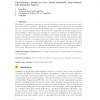Free Online Productivity Tools
i2Speak
i2Symbol
i2OCR
iTex2Img
iWeb2Print
iWeb2Shot
i2Type
iPdf2Split
iPdf2Merge
i2Bopomofo
i2Arabic
i2Style
i2Image
i2PDF
iLatex2Rtf
Sci2ools
ICDT
2016
ACM
2016
ACM
Declarative Probabilistic Programming with Datalog
Probabilistic programming languages are used for developing statistical models, and they typically consist of two components: a specification of a stochastic process (the prior), and a specification of observations that restrict the probability space to a conditional subspace (the posterior). Use cases of such formalisms include the development of algorithms in machine learning and artificial intelligence. We propose and investigate an extension of Datalog for specifying statistical models, and establish a declarative probabilistic-programming paradigm over databases. Our proposed extension provides convenient mechanisms to include common numerical probability functions; in particular, conclusions of rules may contain values drawn from such functions. The semantics of a program is a probability distribution over the possible outcomes of the input database with respect to the program. Observations are naturally incorporated by means of integrity constraints over the extensional and ...
Related Content
| Added | 04 Apr 2016 |
| Updated | 04 Apr 2016 |
| Type | Journal |
| Year | 2016 |
| Where | ICDT |
| Authors | Vince Bárány, Balder ten Cate, Benny Kimelfeld, Dan Olteanu, Zografoula Vagena |
Comments (0)

